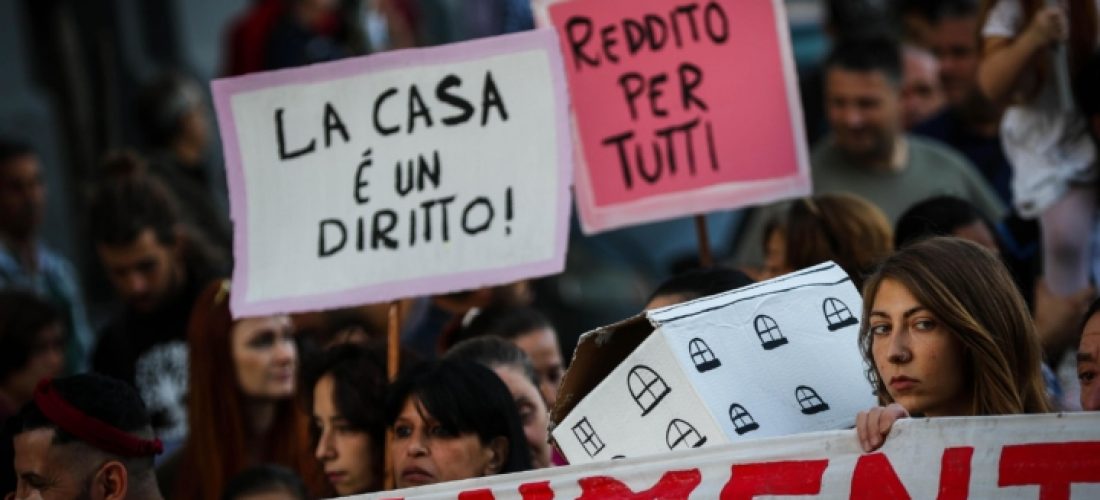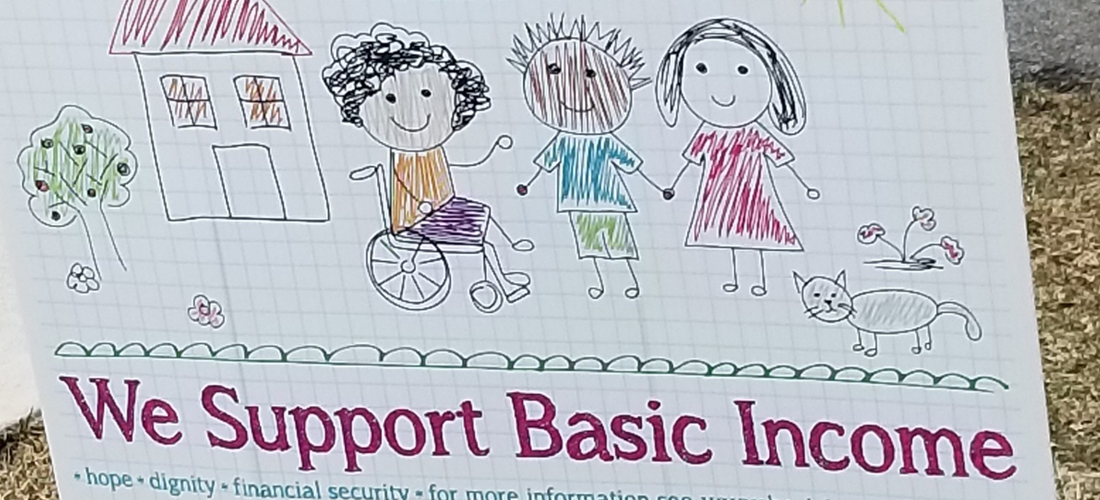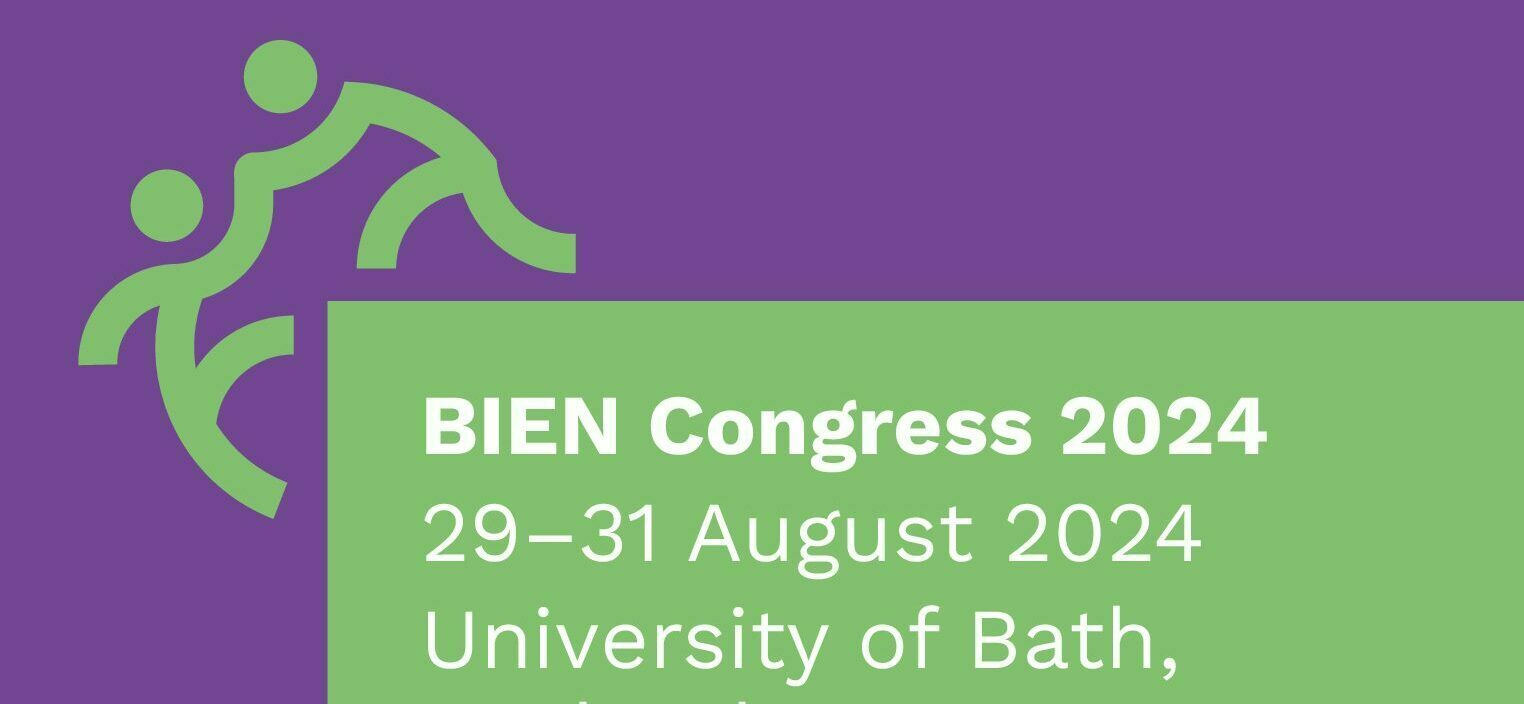The idea of a universal right to motherhood is the result of the reflections carried out within the italian feminist collective DiversamenteOccupate (Differently employed), who started an analysis about motherhood.
« Motherhood » is here to be intended not just as being mothers but, in a broader sense, as a time out of the boundaries of production: a time for regeneration, for creativity, for politics.
This paper aims to contribute to the large debate about the changes in the labor market in Italy and in Europe.
It is a political proposal who tries to act within the interstices of the labor market, still refusing its organization – which is marked by fragmentation of work places, times and conditions and by the increasingly use of information technologies -, and refusing its narrative. It’s a political posture that escapes from the narrative of the work-at-all-cost and the rhetoric of self-employment, which aims to compensate the inadequacy of a dismantled welfare.
Setting the scene
The idea of a universal right to motherhood is the result of the reflections carried out within the feminist collective Diversamente Occupate (Differently employed). In our thirties, working in the field of journalism or in the academic environment, with short term contracts and uncertain job perspectives, we originally began to wonder about motherhood not being ourselves mothers.
Since the Eighties in Italy there has been a debate on precarity and on how women live this work condition. Some studies have dealt with the feminization of work to indicate the extension to men of working conditions generally reserved to women – such as precarious, underpaid and unprotected jobs -, but also the request that men should have skills generally associated with women: capacity of relationship, care, empathy.
The feminization of work “means not only the quantitative expansion of women on the labor market, but also the productive use of the attitude of relationship and care, historically more pronounced among women, trained for centuries in the reproductive role” (Morini, 2010, 13).
Several scholars have also reflected on the ability of capitalism to subsume the ‘difference’ that women bring to the labor market in a mechanism that enhances the ‘otherness’ to better exploit it.
These reflections have not, however, been originated from the economic crisis begun in 2008, but have been developed in the light of the changes occurring in the labor market in the transition from Fordism to Post-Fordism, with the explosion of cognitive work and the proliferation of atypical contracts. In some cases the crisis has brought these transformations already underway to full evidence; in others it has given them new twists and accelerations.
The changes we are talking about concern both the organization of work – now characterized by a fragmentation of places and conditions and the growing use of information technologies – and the discourses that justify the willingness to work even despite insufficient social protections and wages We will mention just a few of these discourses:
he rhetoric of self-employment, which masks behind attractive keywords – such as startup, creativity, social innovation – the pressure to provide for the creation of one’s own work, in the absence of public and private investment for employment, and to compensate for deficiencies of a dismantled welfare through innovative services;
he rhetoric in the business environment promoting the identification between oneself and one’s work, between self-conception and the company, in some cases the project or brand, of which one is responsible;
he uncertainty of the contracts and wages, which makes the possibility to express oneself in the favourite field the only reward for an effort that otherwise would not find reason, neither in the little money earned, nor in poor economic stability.
All together these conditions, both those related to work organization and those resulting from the speeches about work, make the work activity as continuous as invisible. It is an activity that overflows the traditional working times and spaces, but without being recognized as hard work, as an effort, as a continuum, so you can say that everything is work but it is difficult to identify what aims at production.
Diversamente Occupate – Differently employed
Some of us met during the writing of two issues of the journal of feminist political practice DWF – Donna Woman Femme on the theme of work. In those publications, through a multiple voices dialogue, we reflected on the meaning of work in our lives.
Once finished the work on the two issues, we founded the collective Diversamente Occupate (Differently employed), a young women space of thought and action, to which other women later joined, coming from a political movement against the university reform proposed by the Berlusconi Government, namely by Minister Gelmini.
The name Diversamente occupate has been chosen to point out a condition: on the one hand, we are atypical workers with fixed-term contracts, who do not have access to the rights and protections related to open-ended contracts; on the other, the name indicates a political shift from this kind of work, which, thus conceived, does not satisfy our desires and our needs.
In the following years, the collective has continued to work on the theme of job insecurity. Part of our reflections invested the relationship between identity, social status and work.In parallel with these reflections, we started to discuss how to face the gradual elimination of protections in favor of the workers and of unions mediation between employers and workers. In individual negotiations with employers we live experiences of isolation and blackmail and we are constantly lowering our demands just to have the opportunity to work.
We have tried to address this dual challenge – the first relating to interference between work and identity, the second directed to imagine rights and social protections for a labor market that has irrevocably been changing – moving from a feminist perspective, based on the experience of women.
Women have never been fully included in the labor market in a formal way, despite having always worked, and historically they have not built their identity on the basis of the role covered in the work environment. This puts women today in a privileged and authoritative condition to think of a new system of work, for men and for women, that does not represent the only condition of access to the inalienable rights that must be guaranteed to all.
One way to access these rights, which has been much discussed in recent years in Italy, is the basic income, a measure already provided in most European Countries. Another is what we call a ‘universal right to motherhood’.
We would like to draw the path that has taken us from our reflections about the experience of working in a context of crisis and insecurity, with consequences on the ground of citizenship, to the proposal for a universal right to motherhood.
Here we think motherhood not only as having children within (a pair) the couple. Motherhood interests us here:
- as a time outside the bounderies of production;
- as example of those hidden, repressed, mechanisms that allow capitalism to reproduce itself;
- as an opportunity to open a discussion about the need to unhook citizenship from independence, citizenship from work.
To unhook the link between citizenship, independence and work seems, in our opinion, essential in order to think of rights no longer built on a supposed neutral citizen, actually a male, white, heterosexual, full-time worker. Rights must be conceived starting from the bodies, from what I, a human being, can – but I don’t necessarily want and must – experience.
Basic Income
One of the ways identified to face the blackmail of insecurity and ensure protection to so-called atypical workers is the debate on the introduction of a form of basic income. Italy is, in fact, with Greece, the only European Country without a tool of minimum income.
As pointed out by the Basic Income Network Italy, “in front of changes in the labor market, the dichotomies that clearly divided the state of unemployment from the employment have become less and less adequate to describe the reality of the flexible worker” (BIN Italia, 2012, 35). In the new millennium having a work may not be sufficient to ensure a decent life.
In this framework, in Italy in the last years we have started to talk about the need to unhook the access to rights from work and from the type of job contract one has, and about the need for a form of basic income ensuring participation in society regardless of holding a job.
As Carol Pateman wrote in an Italian book called Like a Landscape: “A basic income is crucial to establish and maintain individual autonomy because it provides the material base for the participation to society”.
It is a reformist measure and not a revolutionary one, an instrument of social inclusion, but also a mean to “favor the development of forms of resistance and conflict as a possible element of social recomposition of the different subjectivities today scattered and unable to translate in struggle and social conflict their frustrations and working alienations” (A. Fumagalli, M. Lazzarato, 1999).
Being in the labor market, having a job is no longer sufficient to ensure access to the rights, to social welfare, to services: when jobs are intermittent and poorly paid, when we alternate paid activities, unpaid work and periods of unemployment, when there are dozens of contract forms which do not provide any protection for those who work, we can’t say working is enough to be a citizen, as in the past.
In the context of the various proposals discussed in recent years in this direction, our idea is that releasing access to social security by the possession of an employment contract would help us to free ourselves from any form of blackmail, from the pressure for a continuous availability typical of precarious jobs.
In this context we supported the proposal on basic income, that it would also be a form of restitution for all that unpaid or not recognized work that we provide, starting with the cost-free welfare guaranteed by women once again. From our point of view it should be a universal fit, able to meet the needs of social rights of those who are excluded by traditional security tools.
In our view, it is true that the tools of social security tailored on stable and full-time workers now exclude from access to rights an increasingly significant portion of men and women who work in precarious conditions, with short term job contracts, etc. But it is also true that a basic income without welfare could create a condition of isolation, because the income could totally replace a series of activities and relationships which grant the reproduction of the community.
Monetizing time of social reproduction has its risks, there must be also other ways to enhance caregiving.
We think the basic income as a technical tool in a political and cultural path that reinvents a new paradigm of citizenship. Along this path we can rethink a new concept of citizenship, starting from practices of participation and self-government.
. The second step is about trying to face this discussion from the experience of women. If we look at the history of women it becomes visible that a citizenship built on the labor participation is not problematic only because it excludes those who do not have a steady job. The problem is represented by what Carol Pateman has defined the main criterion of citizenship: the independence.
The citizen is who is independent and this independence is built on masculine skills and attributes. The women represent the dependency for the opportunity to host and create other bodies, women represent a “minus” respect to male performance at work, because a male performance is by definition intended as always available, more reliable, continuous, productive.
Conciliating maternity and work
Considering the strong link between work and citizenship within the current welfare model, motherhood becomes a factor of social exclusion, not negligible and somehow irreversible.
The alternative for women is between becoming like men, erasing the experience of motherhood, or being underrated, as not fully fitting to the request of performativity from the labor market.
Indeed, conciliating maternity and work implies to be ready to fill a lack in order to be competitive for the labor market as well as male colleagues are, while quitting work forces our being women in the mother’s role.
Therefore, the “choice” is between being or not being a mother at all. On top of this, there is more to consider: it is true that it is still possible for women to be mothers and workers, at least for those who benefit the access to services and conciliation policies or those who can count on their families for help.
Nevertheless we still must highlight that this conciliation always implies to suppress that reproductive labor that is essential for human communities. By reducing the time devoted to the maternity experience, in order to come back to work as soon as possible, and by delegating to others the care-giving and up-keeping of the domestic sphere, we are all just confirming that the ideal towards which we move is still the one of independence.
The reproductive labor has always been the hidden experience making life and health of societies possible. Carla Lonzi, Italian feminist, clearly claims that: “We all recognize in the unpaid domestic work the service that allows both individual and State capitalism to exist”.
To use Jules Falquet’s words (Falquet, 2013): both the world of work and the domestic sphere put the woman in the position of an undeserved dispossession of her labor power (through a both individual and collective mechanism).She claims that in domestic systems the dynamics of individual dispossession that is implied in the man/woman relationship has never been really broken. Instead, through the communicating vessels of social relationships, this dispossession has shifted and has included the migrant women as well. Sex and race have become the cornerstone of this appropriation mechanism.
On one hand, the paradigm of productivity at all costs is not called into question and its conditions of possibility are kept in the background: in other words, the work of other women allowing us to cast off the mother clothes to be workers is kept hidden; the fact that without someone else filling the domestic role the asexuated independent citizen could not even exist, is hidden too.
On the other hand, the potentialities of the maternity experience as fertile time, free from the rules of productive labor, are lost and erased. In this sense, maternity is not just a feminine or private matter, although it affects differently men and women. The pressure to be permanently available at work, the logic of productivity at all costs, and the erasure of the social reproduction’s sphere do concern both women and men.
A universal right to motherhood
Maternity gives life to a time which is in conflict with market rules and rhythms. It follows logics and priorities which are very different from the ones in the labor market. For example, a body that sets its own rhythms and a child blowing up the daily schemes are in conflict with the working time management. At the same time, the erasure of the maternity experience is a model for the effacement of bodies and of all those life experiences that are out of the production system and that we have recognized as vital and essential: the care of the self, the relationship with others and politics. Experiences which are now hindered for all, both women and men.
The rhetoric of the conciliation between living and working time, as the myth of the super flexible and multitasking woman, the gender pay gap, etc, are all variations of the same culture that tends to exploit bodies and minds of women, loading on women all the responsibility of reproduction.
A longer step brings us towards a culture of sharing, which thinks motherhood as a right uncoupled from work, an enhanced and valued experience, not only for women, but for the whole society.
A step that requires the transition to another paradigm, not only cultural and symbolic, but also economic. In this sense it would be possible to escape from a forced choice. The power of the generation of another self would no longer be silenced by the cancellation of the woman in favor of the mother. It would be possible to overcome the alternative between the guilt of being an absent mother and the frustration in being a full time mother.
The fact that motherhood is not a desire of all women does not imply that it is only a matter of some, as long as you make concrete what we still see latent: motherhood is not only a matter of who wants it, but of all women, and by extension of the whole society. In these terms, if the experience of motherhood is not the desire of all, it can be supported, recognized and valued by everyone.
That is where the idea of a universal right to maternity came from. We do not intend this right only as a guarantee for motherhood through safeguard options for those women and workers who do not benefit from any right linked to maternity. In Italy, for instance, several categories of women workers, from the temporary ones to the freelance workers, cannot benefit from the same rights of the women who have an open-ended contract, such as: safeguard options in case of termination, maternity leave or remunerated prenatal check-ups.
We rather intend this right as a right to an “unproductive” time in the capitalistic sense of the term. A time that is fully generative, devoted to the care of ourselves and the care of others; a time for a regeneration of bodies and for a regeneration of ideas, plans, spaces and experiences which are not in the circuit of the economic exchange and which are enriching and that should be recognized by the entire society.
We think it as a right because we believe that starting from a gendered perspective on the world and on the world of work, and starting from an embodied experience, the powerful voice of women can speak of citizenship and rights of citizenship avoiding the risk of pure abstractions.
We think it as a universal right since we believe that a right that takes into account bodies could open relevant political spaces for everybody. Maternity intended not only as the experience of giving life to a child, but also as a way to change, think over and take care of the world, means to unlace the link between work and citizenship. Maternity is a way to rebuild a new kind of citizenship rooted in material urges and in the daily life experiences.
Recognizing this as a right means to recognize a non-productive time and space in the capitalistic sense of the word: it is recognizing a reproductive and generative time, dedicated to the care of oneself and of others. It also means accepting that the political paradigm of productivity at all costs has failed.
Bibliography
bin italia (2012): reddito minimo garantito. un progetto necessario e possibile, Le Staffette, edizioni gruppo abele
jules falquet (2013): lo specchio delle allodole. Analisi femministe sul capitalismo finanziario, in sandra burchi e teresa di martino (cura), come un paesaggio. pensieri e pratiche tra lavoro e non lavoro, iacobelli
andrea fumagalli (1999): tute bianche. disoccupazione di massa e reddito minimo garantito, derive e approdi
cristina morini (2010): per amore o per forza, ombre corte uninomade
carole pateman (1989): the disorder of women: democracy, feminism, and political theory, stanford, california, stanford university press
Published Diletama, International Journal of Applied Ethics, n. 18, 2015







